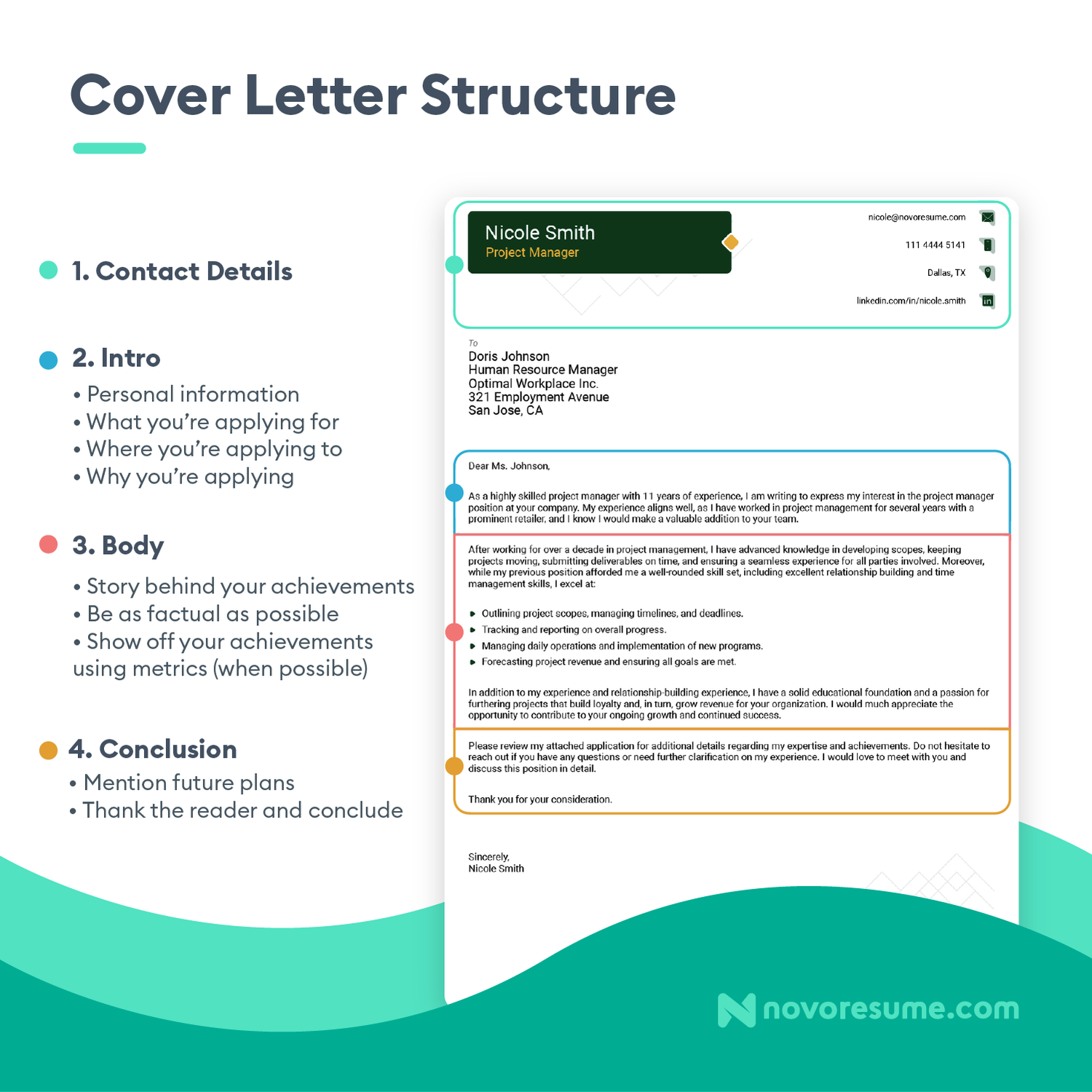You know how to design buildings that are both functional and stunning—your portfolio says it all.
But when it comes to drafting a cover letter, it's like hitting a creative wall. Suddenly, words fail you, and all you see is a blank screen staring back.
Don't worry, you're not alone.
Many skilled architects stumble when they have to put pen to paper—or fingers to keyboard—in a way that's not about blueprints and 3D models.
We've got you covered!
In this article, we're going to lay the foundation for an unbeatable architect cover letter.
Here’s what we’ll cover:
- What a Stunning Architect Cover Letter Looks Like
- 5 Steps to Writing a Job-Winning Architect Cover Letter
- 3 Essential Architect Cover Letter Tips
Ready to build a cover letter that's as impressive as your architectural designs?
Let's dive in!
Architect Cover Letter Example

5 Steps for the Perfect Architecture Cover Letter
You've just seen what a job-winning architect cover letter looks like, and now it's your turn to make one.
To get it right, follow these steps:
#1. Put Contact Information in the Header
Start your architecture cover letter with your contact details right at the top, in the header. It's the same layout you'd use on your resume, so it keeps things consistent.
Here's what to include:
- Full Name. Put your full name at the top of the page.
- Job Title. Make sure the job title on your cover letter matches the exact position you're applying for. Hiring managers tend to juggle applications for various roles at once, so be specific on your application.
- Email Address. Use an email that's easy to remember and professional. For example, swap out immature emails like "coolarchitect99@hotmail.com" for something based on your full name, like “jane.doe@gmail.com”.
- Phone Number. Double-check your phone number, since a typo could mean a missed opportunity. If you're applying internationally, include the dialing code.
- Location. Your city and state or country are usually enough. If you're applying for a remote job or planning to move for this one, say so in your cover letter.
- Relevant Links (Optional). As an architect, we recommend you add links to your portfolio and LinkedIn profile so the hiring manager can quickly see your past work.
Once your own details are in place, add the hiring manager's contact information underneath.
Here’s what to include:
- Company Name. Write down the name of the firm you're applying to.
- Hiring Manager's Name. Do some digging to find out who will be reading your cover letter and address it to them. For example, look at the job ad, the company website, or their LinkedIn job post.
- Hiring Manager's Title. If you find out that the person doing the hiring is the lead architect, use their official title in your cover letter.
- Location. Include the city and state/country of the company. This is especially important for international companies. If the company has more than one office in the same city, you can also specify the street address.
- Date of Writing (Optional). Adding the date you wrote the cover letter gives it a professional touch.
#2. Address the Hiring Manager
Once you've got all your contact information sorted, it's time to address your cover letter to its intended reader — and skip the tired "To Whom It May Concern."
How you start your letter can set the tone and make a strong first impression.
First things first—do a little homework. Browse the job ad, the company's website, or LinkedIn to find out who’s the hiring manager for the architecture role you're eyeing. Their name should be listed on the ad.
Then go ahead and address them respectfully. Using "Ms." or "Mr." followed by their last name is a solid choice. If you're unsure about their gender or marital status, using their full name works fine too.
- Dear Mr. Johnson,
- Dear Emily Johnson,
If you come up empty searching for the hiring manager or department head, no worries. You can address your letter at the department or the company as a whole.
- Dear Architecture Department,
- Dear Hiring Team for Architecture,
- Dear Human Resources Team,
- Dear Head of Architecture,
#3. Write an Eye-Catching Opening Statement
Hiring managers often spend just a few seconds scanning each application. So, nailing the introduction in your architect cover letter is key.
Start your architecture cover letter by stating why you’re writing and why this specific role caught your eye. Expressing genuine interest in the field or the job itself can spark curiosity and make the hiring manager want to read on.
Doing a bit of research about the company can also set you apart from the crowd. The more you understand the company culture, the better you can explain why you’d be a great fit. It shows the hiring manager that you didn't just send out mass applications; you’re genuinely keen on this job.
If you have some experience under your belt, kick off your cover letter with a standout achievement or skill that matches the role perfectly. Keep it brief, though. The goal here is to intrigue the hiring manager just enough to get them to read the rest of your letter.
#4. Use the Cover Letter Body for the Details
The core section of your architecture cover letter should really dig into what makes you the right choice.
The trick here is not to just rehash your architect resume; this is your chance to elaborate on your skills and show how you can contribute to your future employer.
Make sure to point out some of your most notable achievements related to the field. For example, maybe you played a key role in a sustainable housing project or helped design a community center that won awards. Use the job ad as your guide to tailor these to what the company is looking for.
For example, if the company specializes in green building design, emphasize your experience or skills in sustainability and eco-conscious construction. If they're all about cutting-edge, tech-savvy projects, highlight your familiarity with the latest design software.
It's always good to show that you know about the company. Are you drawn to their innovative approach to urban design, or do you deeply respect their commitment to local communities? Mention it in your cover letter. It shows you're not just tossing applications to the wind—you genuinely want this job at this firm.
If you have an employment gap on your resume, the body of your cover letter is the right place to explain it. Did you take some time off work to travel abroad? Tell the hiring manager how it benefited you and how you came back inspired to work as an architect.
And while you’re at it, let your enthusiasm shine through. Make it clear you're excited about the prospect of contributing to the company with your unique skills and perspective.
Also, make sure to avoid these common cover letter mistakes at all costs!
#5. Wrap It Up and Sign It
Your cover letter ending is like adding the final touch to your architectural blueprint.
It's vital to leave the hiring manager with a good impression and make them remember your enthusiasm and expertise long after they've put your cover letter down.
Your conclusion is your final opportunity to underline your distinct architectural prowess and re-emphasize why you're the ideal fit for the role. You want to make sure this final paragraph affirms everything your cover letter has built up so far.
Once you've reiterated your strong points and relevant skills, invite the hiring manager to further discuss your application. A direct, clear call to action can be what takes you to the next stage of the hiring process.
Finally, it’s time to close your cover letter on the right note. Here’s a neat way to structure it:
I'd appreciate the opportunity to discuss my portfolio and how I can contribute to your team. Please feel free to reach out to me at the provided email or phone number for further discussions.
Warm regards,
Jane Doe
While "Warm regards," has a personal touch, you can also consider these other sign-off options:
- Sincerely,
- Best wishes,
- With appreciation,
- Looking forward to hearing from you,

3 Essential Architecture Cover Letter Tips
You know the basic steps to writing your architect cover letter, so now it’s time to take it to the next level.
Just use these architect cover letter tips to make your application shine:
#1. Match Your Resume
It goes without saying that your job application should reflect your attention to detail and aesthetic.
That means the design of your cover letter complements your resume. If they don't align, it can come off as messy, unprofessional, and unattentive.
Your details and contact information should sit neatly on the page, and you should use a uniform font and size throughout your cover letter and resume. Remember to set the right margins and line spacing—going over or under the recommended limits can make your cover letter look empty or stretched out.
It's like designing a space—everything needs its perfect spot!
Or Use A Cover Letter Template Instead
Feeling stuck? Here's a quick fix.
Why not use our free resume builder and cover letter templates?
Both our resume and cover letter templates are crafted with insights from hiring managers worldwide to suit your every need. They save time, meet industry standards, and look fantastic.
Dive in and find a template that matches your resume perfectly!
#2. Mention Skills
Your architect cover letter is the place where you should highlight the most relevant skills that make you a great fit for the job.
Your skills can show the hiring manager what you bring to the table. But don't just throw in a random list of architectural skills and call it a day. Instead, weave your skills into your narrative as a candidate and show them how they make you just the person they’re looking for.
For example, if the ad mentions AutoCAD, highlight your familiarity with the software and how it’s contributed to where you are today. This way, you can paint a clearer picture of your abilities and how they align with the role you're pursuing.
#3. Add Any Relevant Links
Including relevant links in your cover letter is as crucial as having them on your resume. By giving the hiring manager a shortcut to your portfolio or LinkedIn profile, you’re getting them to see your past work as soon as possible.
Even if your resume already has links to your portfolio, personal website, or LinkedIn profile, there’s no reason your cover letter shouldn’t have them too. After all, you don’t want the hiring manager to go back and forth between your cover letter and resume in order to find your portfolio.
Embedding links makes evaluating your application seamless for the hiring manager, and they’re sure to appreciate it.
Key Takeaways
And that’s all there is to writing an architect cover letter!
Now that you’ve seen our architect cover letter example and have the full guide, we’re confident you’ll have a spotless application.
Before you go, let’s do a quick recap:
- Make sure your architect cover letter includes a link to your portfolio so the hiring manager can see your previous projects right after reading your cover letter.
- It’s preferable that your architect cover letter be addressed to the hiring manager. Just do a little bit of digging around the job ad to find out what their name is.
- The body of your cover letter should elaborate on all the architectural skills that make you right for the job. Focus on skills you already have that match the job description.
- Don’t forget to sign your cover letter after writing your conclusion. Just add a call to action and an appropriate closing line, followed by your full name at the bottom.


